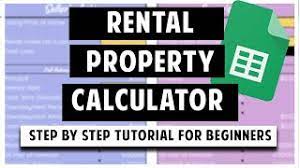If you're considering investing in real estate, rental properties can be an attractive option. Owning a rental property can provide a steady stream of passive income, as well as the potential for long-term appreciation. But before you make any investments, it's important to understand the financial aspects of rental property ownership, including rental property income, rental property investments, and the use of a rental property calculator to evaluate potential investments.
Rental Property Investments
Rental property investments involve purchasing properties with the intention of renting them out to tenants. When done correctly, rental property investments can provide a reliable source of passive income, as well as long-term appreciation as the value of the property increases over time.
One of the main benefits of rental property investments is the ability to generate passive income. When you own a rental property, you can earn money through rent payments from tenants. This income can help offset the costs of owning and maintaining the property, including mortgage payments, property taxes, insurance, and maintenance expenses.
Rental property investments can also provide tax benefits, including deductions for mortgage interest, property taxes, and other expenses associated with owning and managing the property. Additionally, if you own a rental property for more than a year, any profits from selling the property will be subject to long-term capital gains tax rates, which are typically lower than short-term capital gains tax rates.
Rental Property Calculator
One of the keys to successful rental property investments is evaluating potential investments and determining which ones are likely to provide the best return on your investment. This is where a rental property calculator can be a valuable tool.
A rental property calculator is a tool that allows you to input information about a potential rental property, such as the purchase price, financing details, estimated rental income, and expenses. The calculator then generates key metrics like cash flow, cap rate, and return on investment, which can help you determine whether the investment is likely to be profitable.
By using a rental property calculator, you can quickly compare different properties and financing scenarios to determine which investments are likely to provide the best return on your investment. This can help you make informed decisions about purchasing and managing rental properties and maximize your potential for passive income.
Rental Property Income
Rental property income refers to the money you earn from renting out a property to tenants. This income can come from rent payments, as well as other sources like pet fees, parking fees, and late fees.
When calculating rental property income, it's important to consider all potential revenue streams, as well as any expenses associated with owning and managing the property. These expenses can include mortgage payments, property taxes, insurance, maintenance costs, and property management fees.
To calculate your rental property income, you'll need to subtract all of your expenses from your total rental income. This will give you your net rental income, which is the amount you actually get to keep after all expenses are paid.
Conclusion
Rental property investments can be a great way to generate passive income and build long-term wealth. By using a rental property calculator to evaluate potential investments, you can make informed decisions about purchasing and managing rental properties and maximize your potential for profitability.
When investing in rental properties, it's important to consider all of the financial aspects of ownership, including rental property income and expenses, as well as potential tax benefits. By understanding these factors and working with professionals like real estate agents and financial advisors, you can build a profitable portfolio of rental properties and achieve financial independence.

No comments:
Post a Comment
Note: Only a member of this blog may post a comment.